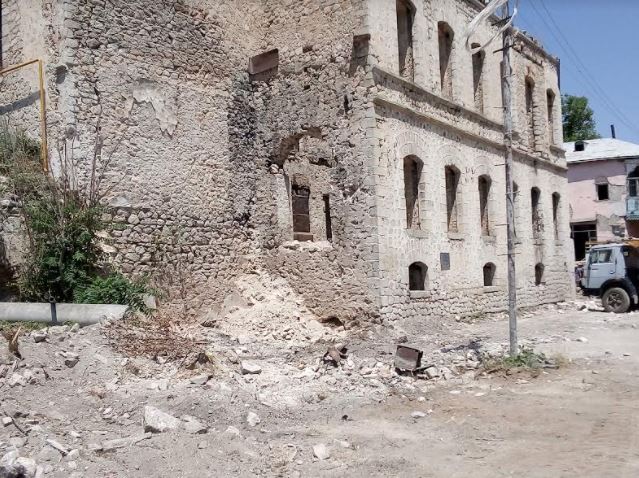By Rachel Avraham
Recently, I was one of 22 foreign experts from across the globe who toured the city of Agdam in the war-torn Karabakh region. There, I was able to witness the consequences of war first hand and see how devastating landmines are for the civilian population. There, if one accidently walked in the wrong area, one could explode in a landmine. Indeed, today, Agdam is a ghost town and the reconstruction process is very slow, to a large part thanks to the widespread use of landmines in the area.
According to the International Committee of the Red Cross, “Mines are now proliferating so fast that there are perhaps as many as 110 million of them spread in 64 countries worldwide, and it is estimated that 2 to 5 million more mines are being laid each year. Scattered like deadly seeds, they kill and maim between 1.000 and 2.000 people per month, most of them innocent civilians.”
In a conference at the prestigious Ada University, Vugar Suleymanov, the chairman of the Mine Action Agency of Azerbaijan, proclaimed: “Azerbaijan is one of the most landmine contaminated countries in the world. Mines are indiscriminate. Since the end of the war, there have been 228 landmine incidents, which injured 184 and killed 39. Armenia has released some of their landmine maps, but only 25% of the landmine data that we have is reliable. This causes indiscriminate suffering to civilians. Indiscriminate mines are the main impediment to the return of refugees.”
At the conference at Ada University, Hikmet Aliyev, the special advisor to Azerbaijan’s President, stated: “The Armenians laid about one million mines in the Karabakh region. On a daily basis, we have people killed and injured because of mine incidents. This is a significant issue that slows down our reconstruction process post-conflict.”
This is because an area can only be designated once again for agricultural use and rebuilding, one week after all demining is completed. This is a major issue in Azerbaijan, when one out of every seven Azerbaijanis is a displaced refugee. In the Karabakh region over the last thirty years of conflict, over 800 cultural sites, archeological sites, mosques, and churches were damaged, destroyed and looted.
Chairman of the State Committee on the Work with the Diaspora Fuad Muradov noted in the conference how the conflict with Armenia and the use of landmines completely destroyed Shusha, Agdam and many other places in the Karabakh region. He added: “Our main goal is to build peace in this region.” However, for that to happen, all landmines must be removed and removing them is an uphill struggle, when the maps you have are not reliable. For this reason, at the conference, former Israeli Communication Minister Ayoob Kara discussed the use of Israeli robots to locate landmines, of which Azerbaijan is already using.
Landmines should be banned worldwide because they are an indiscriminate weapon, which kills and maims innocent civilian men, women and children who accidentally step on them while walking in the street, playing soccer and doing other mundane activities. In fact, in some countries, one third of landmine casualties are women and children, and many of them fall victim to landmines after the conflict has ceased. In fact, in some areas of the world, there are still landmines left over from World War II. This is a travesty that must come to an end. The Talmud says, “Whoever saves a life saves the world entire.” Demining conflict zones like the Karabakh region helps to sanctify human life and is a pivotal part of the peace-building process. For as long as there are landmines, making peace will be an uphill struggle.





